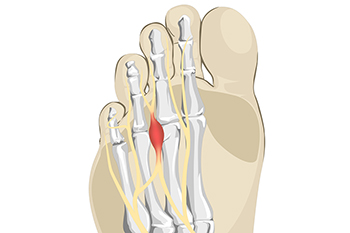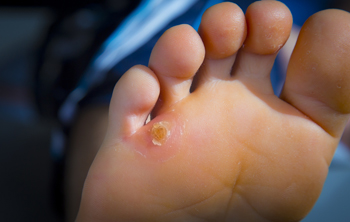Middlefield (860) 349-8500
Wallingford (203) 294-4977
Middlefield (860) 349-8500
Wallingford (203) 294-4977
People who have feet that sweat excessively may have a condition that is known as plantar hyperhidrosis. It may be the result of a neurological or endocrine disorder and can be quite uncomfortable. There are several treatment options, and this can depend on the severity of this ailment. Surgery may be a viable option for successfully removing the sweat glands. Patients who are afflicted with this condition often keep an extra pair of shoes and socks close by. It can be professionally and socially disabling, and many patients who have this condition are often embarrassed. If you think you may have hyperhidrosis, it is suggested that you schedule an appointment with a podiatrist who can offer you the correct treatment solutions.
If you are suffering from hyperhidrosis contact Dr. Gordon Fosdick of Affiliated Foot Care Center. Our doctor can provide the care you need to attend to all of your foot and ankle needs.
Hyperhidrosis of the Feet
Hyperhidrosis is a rare disorder that can cause people to have excessive sweating of their feet. This can usually occur all on its own without rigorous activity involved. People who suffer from hyperhidrosis may also experience sweaty palms.
Although it is said that sweating is a healthy process meant to cool down the body temperature and to maintain a proper internal temperature, hyperhidrosis may prove to be a huge hindrance on a person’s everyday life.
Plantar hyperhidrosis is considered to be the main form of hyperhidrosis. Secondary hyperhidrosis can refer to sweating that occurs in areas other than the feet or hands and armpits. Often this may be a sign of it being related to another medical condition such as menopause, hyperthyroidism and even Parkinson’s disease.
In order to alleviate this condition, it is important to see your doctor so that they may prescribe the necessary medications so that you can begin to live a normal life again. If this is left untreated, it is said that it will persist throughout an individual’s life.
A last resort approach would be surgery, but it is best to speak with your doctor to find out what may be the best treatment for you.
If you have any questions please feel free to contact our offices located in Middlefield and Wallingford, CT . We offer the newest diagnostic and treatment technologies for all your foot and ankle needs.
 The foot condition that is known as Morton’s neuroma can cause pain and discomfort, and it often makes walking difficult. The pain is generally felt in the bottom of the foot, and many patients describe it as a burning and stabbing feeling. Morton's neuroma affects the tissue that surrounds a nerve in the ball of the foot and can be caused by several reasons. These reasons can include having a poor running technique, wearing running shoes that are too tight, or possibly having flat feet or bunions. The pain is described as having the sensation of standing on a marble or pebble. Additional symptoms can include numbness in the toes, and if it is not treated, it may lead to severe pain, causing the patient to limp. A podiatrist is qualified to perform a proper diagnosis, which can consist of having an X-ray taken, or from a manual exam. If you have foot pain, it is strongly suggested that you confer with a podiatrist as quickly as possible, who can provide you with correct treatment techniques.
The foot condition that is known as Morton’s neuroma can cause pain and discomfort, and it often makes walking difficult. The pain is generally felt in the bottom of the foot, and many patients describe it as a burning and stabbing feeling. Morton's neuroma affects the tissue that surrounds a nerve in the ball of the foot and can be caused by several reasons. These reasons can include having a poor running technique, wearing running shoes that are too tight, or possibly having flat feet or bunions. The pain is described as having the sensation of standing on a marble or pebble. Additional symptoms can include numbness in the toes, and if it is not treated, it may lead to severe pain, causing the patient to limp. A podiatrist is qualified to perform a proper diagnosis, which can consist of having an X-ray taken, or from a manual exam. If you have foot pain, it is strongly suggested that you confer with a podiatrist as quickly as possible, who can provide you with correct treatment techniques.
Morton’s neuroma is a very uncomfortable condition to live with. If you think you have Morton’s neuroma, contact Dr. Gordon Fosdick of Affiliated Foot Care Center. Our doctor will attend to all of your foot care needs and answer any of your related questions.
Morton’s Neuroma
Morton's neuroma is a painful foot condition that commonly affects the areas between the second and third or third and fourth toe, although other areas of the foot are also susceptible. Morton’s neuroma is caused by an inflamed nerve in the foot that is being squeezed and aggravated by surrounding bones.
What Increases the Chances of Having Morton’s Neuroma?
Morton’s neuroma is a very treatable condition. Orthotics and shoe inserts can often be used to alleviate the pain on the forefront of the feet. In more severe cases, corticosteroids can also be prescribed. In order to figure out the best treatment for your neuroma, it’s recommended to seek the care of a podiatrist who can diagnose your condition and provide different treatment options.
If you have any questions, please feel free to contact our offices located in Middlefield and Wallingford, CT . We offer the newest diagnostic and treatment technologies for all your foot care needs.
Putting your best foot forward means having healthy feet, which takes time and dedication. As a rule, it is important to keep your feet clean and dry, wear shoes that fit well and give proper support, and practice good foot hygiene. This includes such things as checking for abnormalities, cuts and sores on the skin, properly trimming toenails, removal of calluses, and moisturizing. But even healthy feet are subject to numerous problems, including plantar fasciitis (heel pain), bunions, plantar warts, ingrown toenails, athlete’s foot, corns and blisters. Common injuries include sprains, strains, stress fractures and broken bones. Several serious conditions, such as diabetes, peripheral artery disease, and different types of arthritis also can cause or contribute to foot problems, like swelling, redness, numbness, infections, ulcerous wounds and pain. Further, as you age and become more sedentary, minor foot problems can worsen. To ensure that your feet can take you where you want to go for many more years, it is a good idea to develop an ongoing relationship with a podiatrist who can help you deal with foot and ankle problems when they arise.
Everyday foot care is very important to prevent infection and other foot ailments. If you need your feet checked, contact Dr. Gordon Fosdick from Affiliated Foot Care Center. Our doctor can provide the care you need to keep you pain-free and on your feet.
Everyday Foot Care
Often, people take care of their bodies, face and hair more so than they do for their feet. But the feet are a very important aspect of our bodies, and one that we should pay more attention to. Without our feet, we would not be able to perform most daily tasks.
It is best to check your feet regularly to make sure there are no new bruises or cuts that you may not have noticed before. For dry feet, moisturizer can easily be a remedy and can be applied as often as necessary to the affected areas. Wearing shoes that fit well can also help you maintain good foot health, as well as making it easier to walk and do daily activities without the stress or pain of ill-fitting shoes, high heels, or even flip flops. Wearing clean socks with closed shoes is important to ensure that sweat and bacteria do not accumulate within the shoe. Clean socks help to prevent Athlete’s foot, fungi problems, bad odors, and can absorb sweat.
If you have any questions please feel free to contact our offices located in Middlefield and Wallingford, CT . We offer the newest diagnostic and treatment technologies for all your foot and ankle needs.
 Repeated friction on the foot can result in developing corns. They are hardened areas of skin, and some can cause pain and discomfort. There are three kinds of corns, consisting of hard, soft, and seed. Corns that form on the sole of the foot are referred to as seed corns, and they are generally found in groups. Hard corns can form on top of the toes, and may come from wearing shoes that do not fit correctly. Soft corns are found between the toes, and are typically moist. Relief for most corns can be found when the correct shoes are worn, and wearing specific socks may help to reduce some of the friction. Some patients can experience pain with corns, and it may interfere with completing daily activities. If you have developed any type of corn on your foot, it is suggested that you confer with a podiatrist who can provide the best options for you.
Repeated friction on the foot can result in developing corns. They are hardened areas of skin, and some can cause pain and discomfort. There are three kinds of corns, consisting of hard, soft, and seed. Corns that form on the sole of the foot are referred to as seed corns, and they are generally found in groups. Hard corns can form on top of the toes, and may come from wearing shoes that do not fit correctly. Soft corns are found between the toes, and are typically moist. Relief for most corns can be found when the correct shoes are worn, and wearing specific socks may help to reduce some of the friction. Some patients can experience pain with corns, and it may interfere with completing daily activities. If you have developed any type of corn on your foot, it is suggested that you confer with a podiatrist who can provide the best options for you.
If you have any concerns regarding your feet and ankles, contact Dr. Gordon Fosdick of Affiliated Foot Care Center. Our doctor will treat your foot and ankle needs.
Corns: What Are They? and How Do You Get Rid of Them?
Corns can be described as areas of the skin that have thickened to the point of becoming painful or irritating. They are often layers and layers of the skin that have become dry and rough, and are normally smaller than calluses.
Ways to Prevent Corns
There are many ways to get rid of painful corns such as wearing:
Treating Corns
Treatment of corns involves removing the dead skin that has built up in the specific area of the foot. Consult with Our doctor to determine the best treatment option for your case of corns.
If you have any questions please feel free to contact our offices located in Middlefield and Wallingford, CT . We offer the newest diagnostic and treatment technologies for all your foot and ankle needs.